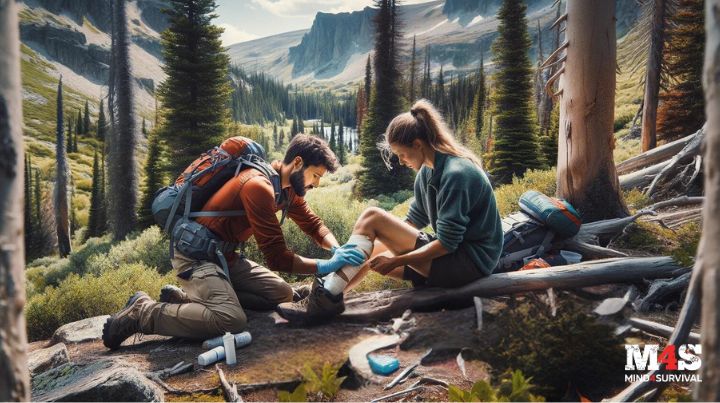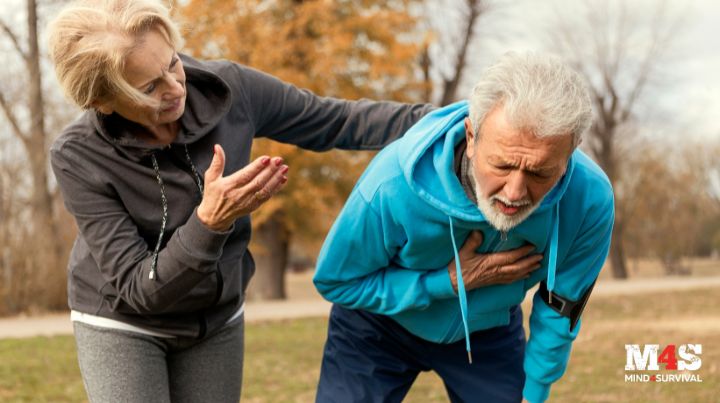Managing Medical Emergencies When Help is Delayed

The ability to manage medical emergencies becomes vital in situations where medical help is delayed or unavailable. Whether on a family outing in a remote location, during a disaster or when your ability to get to higher-level medical care is impeded, knowing how to handle medical situations can make the difference between life and death. This article will provide practical advice, based on personal experience as a paramedic and from running remote medical clinics around the globe, on how to manage medical emergencies effectively when professional help is out of reach.
Basic First Aid Skills
A solid foundation in basic first aid is paramount when managing medical emergencies. These skills equip you to handle common injuries and illnesses effectively. Here's a high-level overview of the essential first-aid skills you should be familiar with:
- CPR (Cardiopulmonary Resuscitation): Knowing how to perform chest compressions and rescue breaths can keep someone alive during cardiac arrest.
- Control Bleeding: Techniques like applying pressure, using bandages, and, if necessary, tourniquets can prevent life-threatening blood loss.
- Treating Burns: Recognize different burn types and know the basic steps to alleviate pain and prevent infection.
- Managing Fractures and Sprains: Immobilizing broken bones and treating sprains helps prevent further injury and manage pain.
- Handling Choking Incidents: Being adept at performing the Heimlich maneuver and back blows can save someone from airway obstruction.
- Recognizing and Treating Shock: Identifying the signs of shock and knowing how to respond can stabilize a person until they get professional care.
- Addressing Hypothermia and Hyperthermia: Understanding how to warm someone with hypothermia or cool down someone with hyperthermia is crucial in temperature-related emergencies.
- First Aid for Poisoning: Knowing how to respond to different types of poisoning, including when to use neutralizing agents and when to induce vomiting.
- Basic Wound Care: Cleaning and dressing wounds appropriately to prevent infection and promote healing.
- Handling Allergic Reactions: Recognizing symptoms of severe allergic reactions and knowing how to use an epinephrine auto-injector.
- Emergency Childbirth: Understanding the basics of assisting in childbirth when help is not immediately available.
These foundational skills are vital in any preparedness plan, giving you the confidence and capability to handle emergencies when professional medical help is delayed or unavailable.
Read this article on Basic First Aid Skills for Preparedness.
Assembling a First Aid Kit

A well-stocked first aid kit is indispensable. You can build your own or buy a pre-built kit and supplement it with other supplies as you increase your preparedness. If you purchase a pre-built kit, this first aid kit on Amazon is an excellent option to get you started.
Whichever route you choose, ensure your first aid kit includes the following items:
- Adhesive bandages of various sizes
- Sterile gauze pads
- Adhesive medical tape
- Antiseptic wipes
- Wound gel
- Tweezers, scissors, and a first-aid needle
- Pain relievers, anti-inflammatory, allergy relief medications
- CPR mask
- Emergency blanket
- First aid guide
The Survival Medicine Handbook is an excellent reference guide for disaster situations!
Pro-Tip: Many medical supplies can be purchased with a Health Savings Account (HSA)
Improvising Medical Supplies
In a long-term disaster, medical supplies may run out or be inaccessible, making improvisation a critical skill. The ability to adapt and use available materials can mean the difference between life and death when professional help is delayed or not coming. Here are some practical tips for creating makeshift medical solutions in challenging circumstances:
- Bleeding Control: Use a clean cloth or clothing as a bandage.
- Splints: Use sticks, rolled-up magazines, or cardboard to immobilize limbs.
- Burn Treatment: Cool burns with any available water source.
Recognizing and Responding to Common Medical Emergencies

Knowing how to identify and respond to common medical emergencies is crucial during disasters. Immediate action can prevent conditions from worsening and save lives if professional help is unavailable. Some medical emergencies to be versed in are:
- Heart Attack: Symptoms include chest pain, shortness of breath, and sweating. If the person is conscious and alert, administer aspirin and keep them calm.
- Stroke: Look for sudden weakness, numbness, facial droop, or difficulty speaking. Keep the person comfortable, and do not give them anything to eat or drink.
- Severe Allergic Reaction (Anaphylaxis): Symptoms include swelling, hives, and difficulty breathing. If an epinephrine auto-injector is available, administer it. Consider providing Benadryl.
- Choking: Perform the Heimlich maneuver to dislodge the object. For infants, back blows and chest thrusts are recommended. This choking rescue device can save a choking victim's life.
Creating a Medical Emergency Plan
Creating an emergency plan is crucial when access to medical assistance may be difficult. A clear, fine-tuned, and practiced plan ensures everyone knows their roles and actions, reducing panic and confusion. This preparedness can significantly increase your chances of managing the situation effectively and maintaining safety for all involved. Here's what to include:
- Emergency Contacts: List numbers for local emergency services, family members, and neighbors who can assist when needed.
- Medical Information: Keep a list of each family member's medications, allergies, and medical conditions.
- Assign Roles: Assign roles to people so everyone knows what to do during a medical emergency. Have backups for each position if the person responsible for a task is sick or injured.
- Practice Drills: Regularly practice emergency scenarios to stay prepared.
Maintaining Hygiene

Maintaining hygiene is vital to preventing infections and illnesses. Poor sanitation, which often happens during disasters and difficult times, can lead to disease outbreaks, infections, and stomach illnesses, exacerbating an already dire situation. Ensuring cleanliness helps safeguard your health and the well-being of those around you, reducing the risk of complications that could worsen when medical attention is limited.
Follow these 11 guidelines to help ensure proper hygiene:
- Clean Wounds: Use clean water to rinse wounds. If no clean water is available, use an antiseptic solution.
- Avoid Contaminated Water: Only use purified water for cleaning wounds and drinking.
- Hand Hygiene: Wash hands frequently with soap and water or use hand sanitizer.
- Sanitizing Surfaces: Regularly clean and disinfect surfaces, especially those used for food preparation, to prevent the spread of bacteria and viruses.
- Proper Waste Disposal: Dispose of waste properly to avoid attracting pests and spreading diseases. Use sealed bags or containers for waste and bury it if necessary.
- Food Hygiene: To prevent foodborne illnesses, ensure all food is cooked thoroughly and stored properly. Avoid consuming expired or questionable food items.
- Personal Hygiene: To reduce the risk of skin infections, maintain personal cleanliness by washing your body regularly with clean water and changing into clean clothes.
- Safe Handling of Human Waste: To prevent contamination, use makeshift toilets and dispose of human waste far from living areas and water sources.
- Dental Hygiene: Brush your teeth with clean water and a toothbrush to avoid dental issues that could become serious without access to professional care.
- Clothing Hygiene: Wash and dry clothes regularly to avoid fungal infections and skin irritations, which can become problematic without medical treatment.
- Avoiding Cross-Contamination: Use separate utensils and containers for raw and cooked foods to prevent cross-contamination and foodborne illnesses.
How to Manage Medical Situations
Effectively managing medical situations during emergencies requires a calm and organized approach. Each individual may have unique needs, especially children, older people, and those with special needs. Ensuring their safety and well-being involves a combination of preparedness, clear communication, and emotional support. By addressing these needs systematically, you can create a more stable and secure environment amidst the potential chaos of an emergency.
Here are some expanded strategies for handling various needs during emergencies:
- Stay Calm: Maintain a composed demeanor to help reduce panic and stress. Your calm presence can reassure others and help them focus on essential tasks.
- Explain Simply: Use straightforward language to explain what's happening and what actions must be taken. This is particularly important when dealing with children, elderly individuals, or those with special needs, as it helps them understand the situation without becoming overwhelmed.
- Medical Supplies: Ensure a ready supply of necessary medications and medical equipment. Keep a detailed list of each person's medical needs, including dosages and schedules, to manage their health effectively during the emergency.
- Mobility Considerations: Plan for how to assist individuals with mobility challenges. This might involve having wheelchairs, walkers, or other mobility aids readily accessible and knowing the safest routes possible.
By addressing these aspects comprehensively, you can better manage medical situations and support the needs of everyone involved, ensuring their safety and well-being during emergencies.
Mental Health Considerations

During emergencies, mental health can quickly decline due to heightened stress and uncertainty. Supporting mental well-being is crucial to maintaining overall health and effective decision-making. Here are practical ways to help yourself and others manage mental health in such situations:
- Stay Calm: Maintaining a calm demeanor can help reduce panic and stress.
- Support Each Other: Offer emotional support and encourage open communication.
- Stay Informed: Reliable information can help reduce anxiety. Avoid spreading rumors.
- Keep Them Occupied: Engage individuals with activities to keep their minds off the emergency. Simple games, books, or even conversations can be effective distractions that reduce anxiety and promote a sense of normalcy.
- Comfort Items: Familiar items can provide significant emotional support during stressful times. Ensure that comfort items like favorite blankets, pillows, toys, or other personal belongings are available to help individuals feel more secure and at ease.
Learning Advanced Medical Skills
Acquiring advanced medical skills is invaluable for individuals dedicated to thorough preparedness. These skills equip you to handle more complex medical situations beyond basic first aid, providing a higher level of care when professional help is delayed or unavailable. Investing time in advanced training enhances your ability to respond effectively in diverse emergency scenarios.
Courses to Consider
- Wilderness First Aid: This course focuses on providing medical care in remote environments where traditional medical facilities are inaccessible. You'll learn to manage injuries and illnesses using limited resources.
- Advanced First Aid: Designed to cover more intricate medical situations, this training includes techniques for dealing with severe trauma, prolonged care, and advanced resuscitation procedures.
- Emergency Medical Responder (EMR): Offering in-depth training for emergencies, this course prepares you to handle critical incidents, perform advanced life-saving procedures, and provide comprehensive pre-hospital care.
Building a Support Network

In times of crisis, a strong support network can significantly enhance your ability to manage emergencies. It provides emotional support, resource sharing, and collective problem-solving, making challenging situations more manageable. Building and maintaining these connections is essential for long-term preparedness and resilience. Here are some steps to establish a robust support network:
- Neighbors: Get to know your neighbors and discuss how you can support each other during emergencies. Do you have a doctor, nurse, or other healthcare provider in the neighborhood? Build trust and camaraderie now while times are good.
- Friends and Family: Maintain regular contact and discuss emergency plans with friends and family members. Knowing you have reliable people to count on can provide immense peace of mind.
- Online Communities: Participate in online forums and social media groups focused on preparedness. These platforms offer valuable and free information, advice, and support from a wider community of like-minded individuals who can help you on your preparedness journey.
The Bottom Line On Managing Medical Emergencies When Help is Delayed
Being prepared to handle medical emergencies when professional help is delayed or unavailable is vital. Mastering basic first-aid skills, assembling a comprehensive medical kit, and learning to improvise with available materials ensure you're ready to address common injuries effectively. Recognizing and responding to emergencies like heart attacks, strokes, and severe allergic reactions, coupled with a detailed emergency plan, reduces panic during crises. Maintaining hygiene to prevent infections, managing the specific needs of children, the elderly, and those with special needs, and supporting mental health through calm and organized communication are essential for overall preparedness and resilience.
What are your thoughts on managing medical emergencies during a crisis? Tell us in the comments below.
Additional Resources:
- Essential Medical Skills for SHTF Situations
- Survival Medicine! SHTF Medical Considerations
- My Diagnostic Medical Kit (A Paramedic's Personal Gear)
- National Institutes of Health (Disaster Medicine)
Stay safe,

FREE Guide
Read the Best Seller
Join Mind4Survival
Stay informed by joining the Mind4Survival! 100% Secure! 0% Spam!
Affiliate Disclosure...
Mind4Survival is a free, reader-supported information resource. If you make a purchase through our link, we may, at no cost to you, receive an affiliate commission.


